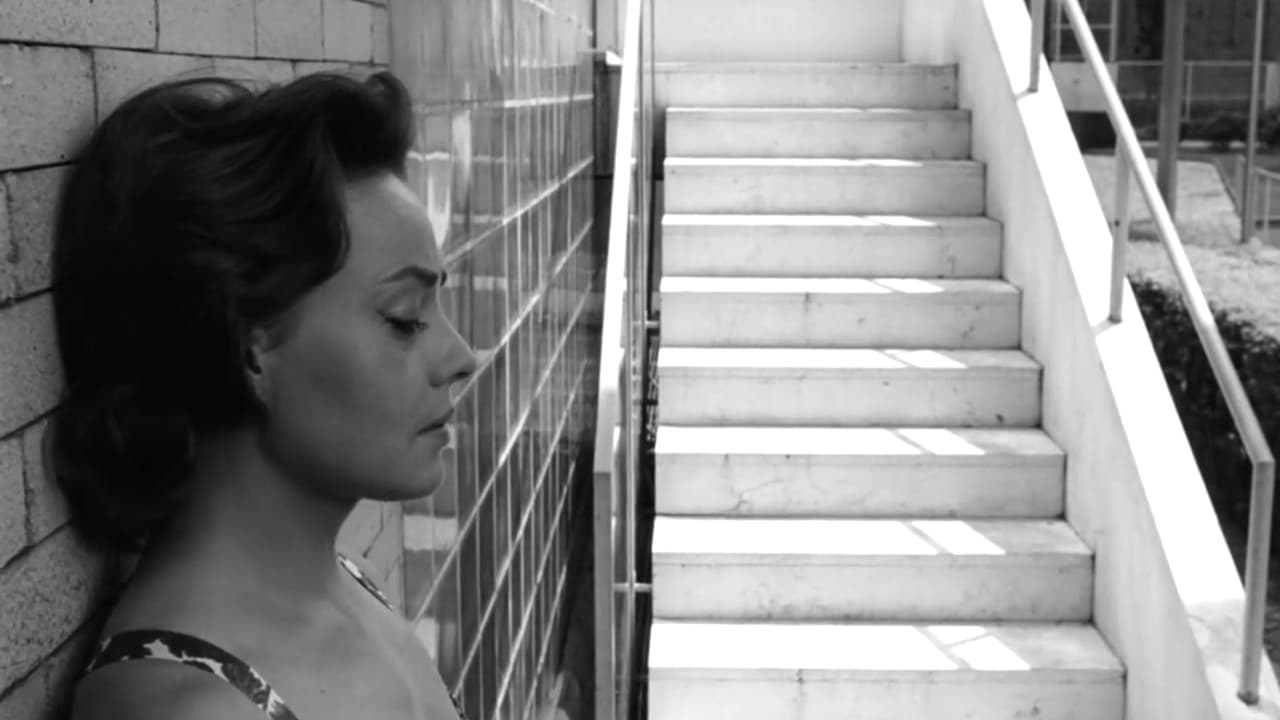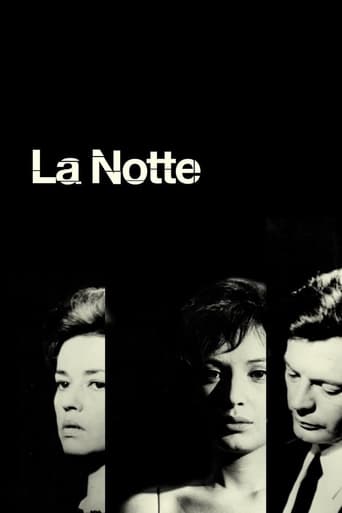Antonius Block
Towards the end of 'La Notte', a married couple (Jeanne Moreau and Marcello Mastroianni) are walking across the fairway of a golf course. They are as emotionally distant as the two trees they approach which stand side by side, not touching. Behind them stretches the past which has led them to this point, their marriage failing, and before them is a very uncertain future. The entire film builds up to this moment, and it's powerful.We get a first insight into Mastroianni's character when he can't resist a mentally ill woman's advances after leaving his dying friend in a hospital, with his wife waiting in tears below. It's a very surprising moment, and it's underlined by director Michelangelo Antonioni when he later shows Mastroianni not interested in the least when Moreau is naked and getting out of the bathtub. In one moment after another from then on, through their dialog, his obvious interests in other women, and her ennui, we find just how poor their relationship has become. I have to say, this film was a little slow in the first half as Moreau wanders through the streets of Milan, having left her husband's book signing. I mean, if there's anyone I would like to see wandering around, stopping young men from fighting, watching bottle rockets get set off, meeting a variety of people, etc it would be Moreau, who is absolutely exquisite, but I did wonder where this was going. However, the ponderous nature of this sequence conveys the malaise in her relationship, and her wandering aimlessly in life, not knowing where to turn.That evening, there is a scene in an erotic nightclub, where Mastroianni is intent on watching a couple of scantily clad dancers, barely paying attention to his bored wife. I thought Antonioni was clumsy in filming this sequence, my least favorite, and the fact that the dancers were black contortionists seemed, I don't know, unnecessarily salacious and stereotypical. I suppose the degree to which the female dancer writhed around is being juxtaposed with the sterility of the couple's interaction, so again, there is a point.Where the film really picked up for me is at the party at a filmmaker's mansion. Mastroianni meets and pursues his host's daughter (Monica Vitti), right under his wife's gaze, and she meets and is pursued by a young man (Giorgio Negro). There are some beautiful images captured here, my favorite of which was Moreau and Negro driving slowly in his car, rain pouring down and streaming across the windows. They're soaked from having been out in the shower, and we see their animated faces, together in the little cocoon of his car, through light and shadow, wondering if this is the start of something new for her. Another is Mastroianni and Vitti playing a silly game on a floor, first with just the two of them, and then with many other party-goers. There is a moment when we see their reflections in a pane of glass, as if they're not real, and simply shadows of themselves. Reflections of one sort or another are a recurring motif in the film.The party itself gets a little wild, with guests jumping in the pool in the rain, which creates some indelible images, but what I loved were the quieter scenes. Moreau saying she doesn't feel the least bit jealous, even as he practically flaunts his infidelity, and that's the biggest problem. The poetry of Vitti's recording:"From the living room today you could hear dialogue from a film on television. 'If I were you, Jim, I wouldn't do that.' After that line, the howling of a dog, slow and sure, rising in a perfect arc and trailing off in a great sadness. Then I thought I heard an airplane, but there was silence, and I was glad. The park is full of silence made up of sounds. If you press your ear to a tree and listen, after a while you'll hear a sound. Perhaps it comes from within us, but I prefer to think it's the tree. Within that silence were strange noises that disturbed the soundscape around me. I closed the window, but the noises persisted. I thought I'd go crazy. I don't want to hear useless sounds. I want to pick them out throughout the day. Same with voices and words. So many words I'd rather not hear, but you can't escape them. You must resign yourself to them, like the waves when you float on your back in the ocean."And then Mastroianni's letter, which is brilliant:"When I awoke this morning, you were still asleep. As I slowly emerged from my slumber, I heard your gentle breathing, and through the wisps of hair over your face, I saw your closed eyes, and I could barely contain my emotion. I wanted to cry out, to wake you up, because you slept so deeply you almost seemed lifeless. In the half light, the skin of your arms and throat appeared so vibrant, so warm and dry, that I longed to press my lips against it, but the thought of disturbing your sleep, of having you awake in my arms again, held me back. I preferred you like this, something no one could take from me because it was mine alone - this image of you that would be everlasting. Beyond your face I saw my own reflection in a vision that was pure and deep. I saw you in a dimension that encompassed all the times of my life, all the years to come, even the years past as I was preparing to meet you. That was the little miracle of this waking moment: to feel for the first time that you were and always would be mine, and that this night would go on forever with you beside me, with the warmth of your blood, your thoughts, and your will mixed with mine. At that moment I understood how much I loved you, Lidia, and the intensity of the emotion was such that tears welled up in my eyes. For I felt that this must never end, that all our lives should be like an echo of this dawn...with you belonging to me but actually a part of me, something breathing within me that nothing could ever destroy except the dull indifference of habit, which is the only threat I see. Then you awoke, and with a sleepy smile kissed me, and I felt there was nothing to fear, that we'd always be as we were at that moment, bound by something stronger than time and habit."Now it seems pretty surprising he would forget he had written that (!), but that fact emphasizes just how far he's drifted. The sentiment he expresses - to hold on to that moment in a relationship - and the sad feeling it evokes hearing it read out loud, is very touching. In life there are few absolutes - friends will die, relationships will stagnate, and other people may come along, but can those powerful early moments of love be sustained, if one clings to them?
Christopher Culver
In the late 1950s and early 1960s, the Italian director Michelangelo Antonioni shot a series of films exploring the psychological torment of his bourgeois protagonists. In spite of the wealth and security they established, they had no idea what they wanted in life or what they were supposed to do. In spite of busy social lives, they found it impossible to truly connect with other people. LA NOTTE, from 1961, is one of these, and I think it's the very best of them.As the film opens, one morning in Milano, married couple Giovanni (Marcello Mastroianni) and Lidia (Jeanne Moreau) visit their friend Tomasso (Bernhard Wicki) in the hospital as he lays dying. Lidia is clearly shaken by the experience and, after Giovanni leaves for an appearance to promote his new book, the camera tracks Lidia through a long, aimless walk around Milano as she processes her thoughts. Here Antonioni (anticipating his later film Il Deserto Rosso) shows the drastically changing face of Milano in the postwar construction boom, and the appearance of new tech gadgetry in everyday life, as just one more way people can feel they have nothing certain they can hold on to in this world.Giovanni and Lidia, while never outright squabbling, have clearly grown cold towards each other. Gradually one begins to wonder if there is any life left in their marriage whatsoever. Things come to a head, however, when Giovanni and Lidia go that evening to a party at a rich industrialist's villa, and Antonioni's favourite actress Monica Vitti appears. Vitti's role as a foil to Giovanni and Lidia is powerful and moving, but I think its precise nature should be left unsaid here, as it's better audiences aren't spoiled first.A mere description of the plot might seem like nothing happens in this film besides bored people talking and yet another mid-century European cinematic tale of adultery. But LA NOTTE is a film of incredible visual poetry, almost like the work of Andrei Tarkovsky. Even scenes that evoke the characters' boredom are shot as such beautiful tableaux that the viewer is enraptured. Antonioni often shoots his characters reflected in mirrors and the like, and there is some cinematic legerdemain here that just makes you go "wow".Appearing in Antonioni's body of work between two similar films that are often considered a trilogy, LA NOTTE has often got less buzz than its predecessor L'AVVENTURA, with its daring plot twist, or its successor L'ECLISSE with its chic Monica Vitti-Alain Delon love affair. But I think that in terms of the picture-perfect visuals and elegant pacing, LA NOTTE deserves every bit as much praise as those other two classic films.
elvircorhodzic
LA NOTTE is a drama that focuses on a crisis and infidelity in a marriage.A prominent writer and his beautiful wife visit their dying friend in a hospital in Milan. His new book has just been published, and their friend, despite his heavy pain, praises his work. Writer's wife, visibly shaken, leaves a hospital in tears. However, her husband, who has stayed a little longer with their friend, has found himself in a lewd game of a seduction with a young and mentally ill girl in the next room. Later, he sees his wife crying but does not comfort her. As they drive off, he tells her about his "unpleasant" encounter with the sick woman and is surprised when she dismisses the incident. Spouses are emotionally moving away from each other. However, they attend together a swanky party thrown by a millionaire businessman...The story is based on alienation, lack of love and misunderstanding in the High Society. Mr. Antonioni has, in an explicit way, introduced a failed marriage. However, that "empty" game in the lives of wealthy people gradually becomes boring. That world, which is full of an elegance and styles, it is very tedious and lonely. The protagonists have condemned themselves to an excessive alienation. Each bright moment in their lives is actually an escape from the actual situation. However, they will have to face the truth.This story is not overly exciting, but it is very suggestive. The main protagonists are constantly emphasize the emotional exhaustion, boredom and internal anxiety. Characterization is quite superficial.Jeanne Moreau as Lidia is a woman who emotionally dying. Her mood goes from bad to worse. Her eyes understand and accuse at the same time. Marcello Mastroianni as Giovanni Pontano is a bit silly character as her husband. He is lost in his art and the emptiness of their marriage. His performance is very pale. Monica Vitti as Valentina Gherardini is a pleasant phenomenon in the latter part of the film. However, she is a dark and impersonal character, who did not bring a change in the rhythm.The biggest flaw in this film is the absence of one character as a "relief valve" or perhaps some moderate catharsis at the end.

